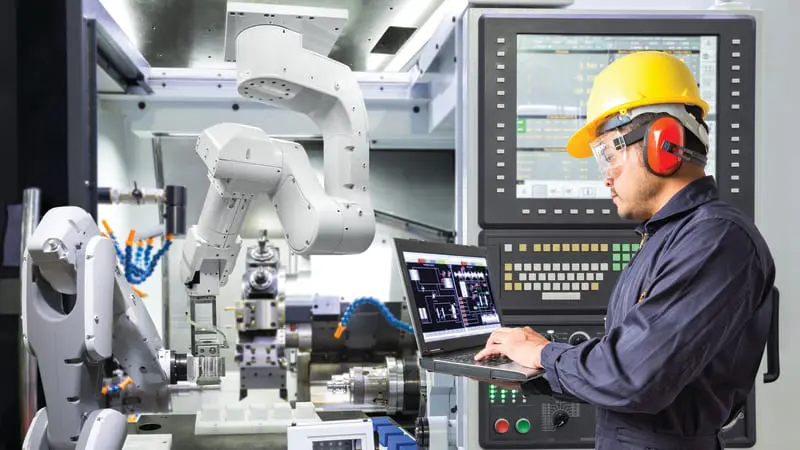All students are required to bring their own notebooks for lessons. You may refer to the required technical specifications for notebook HERE.
| REGISTRATION PERIOD APPLICATIONS CLOSED |
|||
| COURSE DATE | 20 Apr 2026 - 15 Oct 2028 | COURSE DURATION / FREQUENCY | 3 hours/session (3 days/week) |
| MODE OF LEARNING | Facilitated Learning (Face-to-Face/ Online Synchronous) and Asynchronous E-Learning | COURSE VENUE | Temasek Polytechnic |
Digitalisation is taking over the world. It requires constant upskilling to stay ahead of the curve. As more companies go digital, there is a strong demand for talent in the field of computer engineering, and you can be one of them!
This course provides reskilling and upskilling training to existing professionals. The new skills acquired will help you leverage the new employment opportunities from industries such as advanced manufacturing, electronics, engineering services and infocomm. You will gain knowledge and skills in emerging technologies in computer engineering, enabling you to contribute in the areas such as industrial smart solutions, data analytics, artificial intelligence and automation.
This module covers microcontrollers, data acquisition and networking. It equips learners with knowledge and skills in programming microcontrollers and data acquisition devices, and interfacing with sensors and actuators for application development. The module also imparts skills in networking and integration to enable communication between subsystems which will serve as the hardware and connectivity backbone of IOT systems.
| Subject Code | Subject | ||
|---|---|---|---|
| ECMC101 | Microcontroller Interfacing
This module covers the basic architecture of microcontrollers and the interfacing of various input and output devices to the microcontroller. It provides knowledge and skills on programming the microcontroller to interface with the real world through the input and output devices. |
||
| ECMC102 | Microcontroller Applications
This module provides you with working knowledge on microcontroller architecture, the features and characteristics of the internal peripherals in the microcontroller, such as interrupts, Timer and Pulse Width Modulation in order to design and implement an embedded system that involves hardware and software interfacing. The subject also covers the features of evolving microcontrollers that support Industrial Internet of Things (IIoT) applications. |
||
| ECCC103 | Data Acquisition & Networking
This module equips student with the knowledge and skills essential for data acquisition from the real world through sensors for further processing and control of equipment, as well as integration with other subsystems through networking.. Commonly used industrial connectivity standards and fieldbuses, as well as relevant hardware and software interfaces suitable for such integration, are also covered. |
Encompassing database systems, enterprise web and mobile applications, this module equips learners with knowledge and skills on full stack development covering server programming, database management and client application development which will serve as the software backbone for IOT systems.
| Subject Code | Subject | ||
|---|---|---|---|
| ECSE103 | Database Systems
This module provides you with the basic knowledge of designing and implementing of a database, and the appropriate retrieval of the data through queries from the client application through a business logic layer. |
||
| ECCC104 | Mobile Applications Development
This module covers the development of applications on mobile and wireless computing platforms. It provides an overview of Mobile Web and Mobile Applications, their importance and benefits, as well as the technologies and methodologies for their development, such as the architectures, frameworks, standards, programming languages, design process and tools. |
||
| CAN1C01 | Web Application Development
This subject introduces the concepts of web application development. Topics covered include web page design, front-end and back-end web development and web deployment. |
This module provides a range of industrial IOT knowledge and skills essential for digital transformation in this era of Advanced Manufacturing and Industry 4.0. It encompasses the various components of IOT, IOT protocols, Industrial communication protocols to enable the flow of data from sensors and subsystems to the cloud for further IOT data management and analytics. Knowledge and skills in digital twin implementation will be included to enable development of the virtual versions of the physical systems for remote troubleshooting, management, monitoring and control.
| Subject Code | Subject | ||
|---|---|---|---|
| ECMC104 | IIOT for Advanced Manufacturing
This subject provides knowledge, skills and design approaches in using embedded systems, sensors, actuators and appropriate data communication technologies such as sensor networks, edge and cloud computing to build and setup an IIOT environment. A systems engineering approach will be adopted, under which you will review key technologies from prior learning for the different levels of the IOT (Internet of Things) stack and figure out how these different levels could be integrated to form complete IIOT systems in Advanced Manufacturing. |
||
| ECCC102 | Industrial IoT Analytics
This subject provides the essential concepts and skills needed for implementing digital transformation in smart manufacturing plants. It covers the application of industrial software platforms to wirelessly interconnect sensors, Internet of Things (IoT) devices and equipment. The students will learn to develop dashboard for acquiring, analyzing and displaying data that is commonly found in Advanced Manufacturing. Modern approaches in activation of hardware and software responses when interventions are required for process improvement or corrective actions are also covered in detail. |
||
| CAN1C03 | IoT Security
This subject introduces the security and privacy issues involved in the implementation of Internet of Things (IoT) applications and services. Topics covered include cryptography, capability, access-control mechanisms, authentication models and privacy support through data abstraction, integration and data synchronisation. |
This module comprises subjects imparting Analytics, Visualisation, AI and Intelligent Automation skills for digital transformation. It will equip learners with knowledge and skills required for integration of Operational Technology (OT) with Information Technology (IT) to enable hyper-automation for creating smart people-centric spaces and to augment humans.
| Subject Code | Subject | ||
|---|---|---|---|
| CAA1C04 | Data Visualisation & Analytics
This subject covers the data analytics lifecycle, including gathering, cleaning, processing and visualizing of data. Exploratory data analysis methods, descriptive and predictive analytics and the presentation of insights will also be covered. |
||
| ECSE107 | Intelligent Automation
This module provides you with basic knowledge and hands-on digital transformation skills on rapid multi-experience application development and integration of users, tasks and systems towards enhancing productivity, human augmentation and automatic data-driven decision-making. It covers techniques on how to leverage on data from information systems and IoT devices for agile response and productivity. This subject will enable you to automate data-driven decision making through integration of advanced analytics and learning models to applications. |
||
| ECSE106 | Artificial Intelligence Applications
This module provides students with the fundamental concepts of Artificial Intelligence (AI) and Machine Learning (ML). It covers knowledge and skills in AI techniques and tools to build intelligent learning models from real-world data, through training, testing, validation and optimisation. Through hands-on group projects, they will build AI-based applications to add intelligence to existing systems. |
Modes of Assessment
- Written and Practical tests
- Assignments
- Projects
For more information on course fee / schedule, or to apply,
Career Opportunities
Graduates of this course can look forward to taking up the following types of positions:
Assistant Equipment Engineer/Assistant Process Engineer/Assistant Integration Engineer/Assistant Product Engineer/Associate Embedded Systems Engineer in the electronics and engineering related sectors
Assistant Software Engineer/Data Analyst/Associate Data Engineer in the engineering and infocomm related sectors
Entry Requirements
| ‘O’ Levels | At least 3 ‘O’ Level passes AND 1 year of relevant working experience |
| OR | |
| Higher Nitec | GPA ≥ 2.0 |
| OR | |
GPA ≥ 1.5 AND 1 year of relevant working experience |
|
| OR | |
| Nitec | GPA ≥ 3.5 |
| OR | |
GPA ≥ 3.0 AND 1 year of relevant working experience |
|
| OR | |
| Higher Nitec in Technology | GPA ≥ 2.0 AND 1 year of relevant working experience |
| OR | |
| Higher Nitec in Service | GPA ≥ 2.0 AND 1 year of relevant working experience |
| OR | |
| Nitec in Technology | GPA ≥ 3.5 AND 1 year of relevant working experience |
| OR | |
| Nitec in Service | GPA ≥ 3.5 AND 1 year of relevant working experience |
| OR | |
| WSQ Qualification | Relevant WSQ Qualification with 1 year of relevant working experience AND WSQ Workplace Literacy Statement of Attainment (SOA)(Level 6) AND Workplace Numeracy Statement of Attainment (SOA)(Level 6) |
| OR | |
| Without relevant academic qualifications | At least 2 years of relevant working experience |
Applicants who do not meet the entry requirements may be considered for admission to the course based on evidence of at least 2 years of relevant working experience or supporting evidence of competency readiness. Suitable applicants who are shortlisted may have to go through an interview and/or entrance test. The Polytechnic reserves the right to shortlist and admit applicants.
Suitable For
The intended target audience is non-diploma working professionals who are currently working in or aspiring to join the Advanced Manufacturing, Electronics, Engineering Services, and Infocomm sectors. This course will provide participants with opportunities to learn and apply knowledge in traditional computer engineering areas as well as emerging technologies such as Industrial Internet of Things, Artificial Intelligence and Machine Learning. Participants will be able to contribute in the converging trends of Operational Technologies - Information Technologies.
Course Contact
- Mainline 67881212
-
Monday - Thursday: 8:30am - 6:00pm
Friday: 8:30am - 5:30pm
Closed during lunchtime, 12:00pm - 1:00pm
and on weekends and public holidays. - https://www.tp.edu.sg/tsa
-
Temasek SkillsFuture Academy (TSA)
Temasek Polytechnic
East Wing, Block 1A, Level 3, Unit 109
21 Tampines Ave 1
Singapore 529757
Temasek Polytechnic reserves the right to alter the course, modify the scale of fee, amend any other information or cancel course with low enrolment.









/D in Infocomm and Digital Media (ICT Systems, Services _ Support)_tn.webp)



